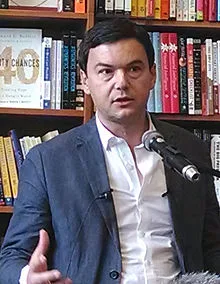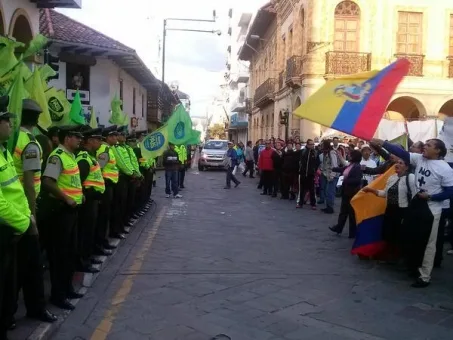French economist plays a central role in latest Correa tax policy; protests against inheritance tax intensify in major cities, including Cuenca
As protests mount against proposed legislation that would increase Ecuador’s inheritance tax, President Rafael Correa says that much of the inspiration behind the legislation comes from French economist Thomas Piketty.

French economist Thomas Piketty
The protests are being staged in Ecuador’s major cities, including Cuenca, although large crowds of Correa supporters have also gathered to shout down the anti-government side. In Cuenca on Tuesday, those opposing changes in inheritance tax rates were also greatly outnumbered by campensinos protesting a government-mandated change in water management rules in rural areas.
Correa says that higher inheritance tax rates will affect the wealthiest Ecuadorians and not the poor or middle class. He readily admits that the tax is intended to redistribute wealth from the rich to the poor, and says he has been inspired by Piketty’s ideas.
Piketty, author of the 2013 book Capital in the Twenty-First Century, argues that under modern economic systems, the return on capital held by the rich is greater than the overall economic growth rate, which leads to increasing concentration of wealth and fewer opportunities for the poor and middle class. He suggests that governments should adopt aggressive policies to reduce financial inequality. The best way to do that, he says, is through a system of progressive wealth taxes, including taxes on inheritance and capital gains.

Protesters against higher inheritance taxes in Parque Calderon on Tuesday. Photo credit: El Mercurio
“Obviously, if the trend continues of the rich getting richer and the poor getting poorer, it will lead to a bad ending,” Piketty says. “This has happened before in history and the violence and upheaval that resulted tore societies apart,” he says.
Correa met Piketty at a conference last year in Buenos Aires and has been in touch with him since then. “The only way to make fundamental changes in Ecuador is through a redistribution of wealth,” Correa says. “We don’t do this by giving away money, but by providing better education and services to elevate people from poverty and inequality. This takes time, but we must begin now.”
When it was first proposed, Correa said that all inheritance about $800,000 would be taxed at a rate of 77.5%. He modified the proposal before submitting it to the National Assembly, reducing the top rate to 47.5% for direct heirs, who make up the majority of inheritors.
Those opposed to the proposed tax change include Quito Mayor Mauricio Rodas and Guayaquil Mayor Jaime Nebot, who say it is unfair to those who have worked hard to accumulate savings and, that it will damage the private enterprise system in Ecuador.
Rodas called on the president of the National Assembly to move slowly on Correa’s proposal, saying that its adoption could destabilize the country. “Look at what’s going on in the streets, look at the discomfort of the citizens. This is something that cannot be ignored,” he said.
Former presidential candidate Guillermo Lasso predicted that passage of the legislation would undermine Correa’s chances of reelection in 2017, if he decides to seek another term. “The people will not forgive him for this. He is damaging his chances to remain in office,” Lasso said.




















